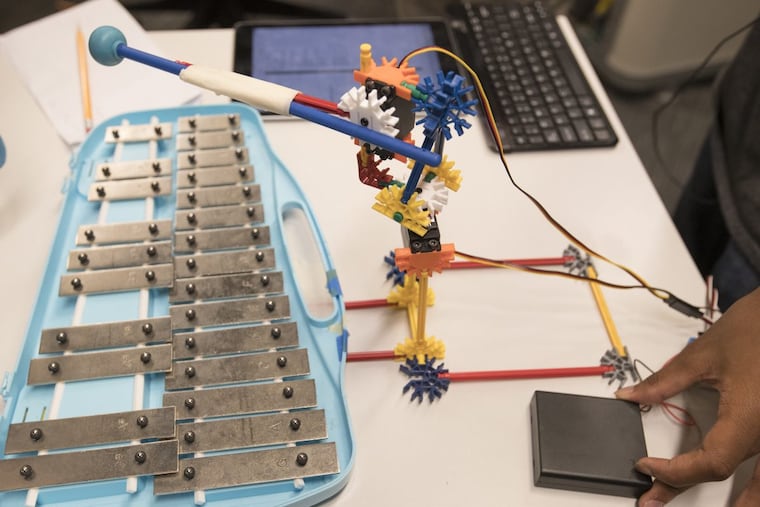Robots and xylophones? At Drexel camp they make beautiful music together
At a moment when many educators are treating the idea of blending science and the arts into new pathways toward invention like a hot new release, that notion is something of a "golden oldie" at Drexel's Summer Music Technology camp.

Some robots are born into a humdrum life of working on an assembly line or a dangerous task like cleaning up nuclear accidents.
The mission for the tiny android that 14-year-old Samaj Schell was building with a K'nex building kit, two small motors, and a microcomputer inside a Drexel University lab was arguably less important but felt a lot cooler: Holding a tiny mallet and pounding out notes on a xylophone.
Schell, a rising 10th grader at Friere Charter High School in Center City, showed off on Thursday his creation at Drexel's Summer Music Technology (SMT) camp for area high school kids as it pounded out the C-E-G notes that he'd programmed on his iPad, overcoming an initial glitch that had the robot pounding "A" instead. "It's trial and error," he shrugged.
Why make a robot play the xylophone?
"A better question is, why not?" replied Schell, summing up the ethos of the summer program at Drexel's ExCITe (Expressive and Creative Interaction Technologies) Center, where kids learn to make beautiful music through science, and vice versa. "When I was in middle school I did a little bit of robotics … and music is a must need in my life," the teen said.
At a moment when many educators are treating the idea of blending science and the arts into new pathways toward invention like a hot new release, that notion is something of a golden oldie at Drexel's SMT camp, which since 2007 has worked with some 200 high school-age kids from across the Philadelphia region in merging youthful passions for making music and for new technologies into something unique.
In a long lab complex with glass walls, the 25 students at this summer's camp sat at long tables, pounding out a symphony of projects — making sensors that can trigger a synthesizer with light or motion, coding a "tambourine robot" so it bangs an empty Pringles can, or designing mobile apps that can change a drumbeat or an octave on a piano.
Youngmoo Kim, the director of the ExCITe Center, who came up with the idea for a music and technology camp a decade ago with help from a National Science Foundation start-up grant, said the relationship between music and science "has always been symbiotic," dating back to the ancient Greeks. But in the 21st century he finds the burning desire of adolescents to create new music an especially useful way to introduce them to skills such as coding or robotics that can open new avenues to careers or creativity.
"I can't predict what things they're going to do," said Kim, who has insisted that the camp remain free of charge and include kids from a wide spectrum of backgrounds and talents. He said he'll come into the camp on a Friday and "'Whoa, I never in a million years would have thought of that! — moments of creativity that inspire innovation."
The experience for kids at the week-long camp mirrors the life journey of Kim, who was attracted to the seemingly opposing magnetic poles of music and technology going back to his undergraduate days at Swarthmore College, where he double-majored in music and engineering. The pattern repeated at Stanford University, where he earned master's degrees in electrical engineering and voice, and in his Ph.D. studies at Massachusetts Institute of Technology (MIT) in media arts and science, a prelude to launching a music technology lab at Drexel in 2005.
Today, Kim still performs in a local a cappella group, the Tonics, and can laugh off questions about choosing between music and science. "My whole life has been spent not having to answer that question," he said.
At a nearby table, 16-year-old Jackson Craig, a rising 10th grader at Germantown Friends School wearing a Beach Boys "Pet Sounds" T-shirt, was working on a high-tech volume control that can amply distortion or other sound effects in his guitar. Craig — who's been playing guitar since he was 8, and recently performed a solo acoustic gig at World Café Live — said the drive to make better music encouraged him to explore technology.
"I'm really into the music," Jackson said. "I don't know anything about the technical part of it. It's important to know — especially in the music industry today."
But other kids at the Drexel camp said they see their future in computer science or advanced robotics — and that music is a fun way to acquire new skills.
"I like coding a lot," said Jordyn Dennis, a 15-year-old rising sophomore at Philadelphia's Central High School, who had rigged up the tambourine robot with the Pringles can. "This program was hard," said Dennis, who had learned a new computer language to get her cyborg to play to the beat.
It all works toward the final-day performance, where the campers show off their various apps, robots, and gadgets in a mini-concert. On this day, the kids were rehearsing Mick Ronson and Bruno Mars' "Uptown Funk." At first, the focus is less on tech and more on music, with traditional fits and starts. The boy backup singers struggle to clap and nail the vocals at the same time, until one of the female backups doubles over in laughter at a botched take.
"This is good chaos," said Kim, in what could be the camp's mantra. "It's controlled chaos."